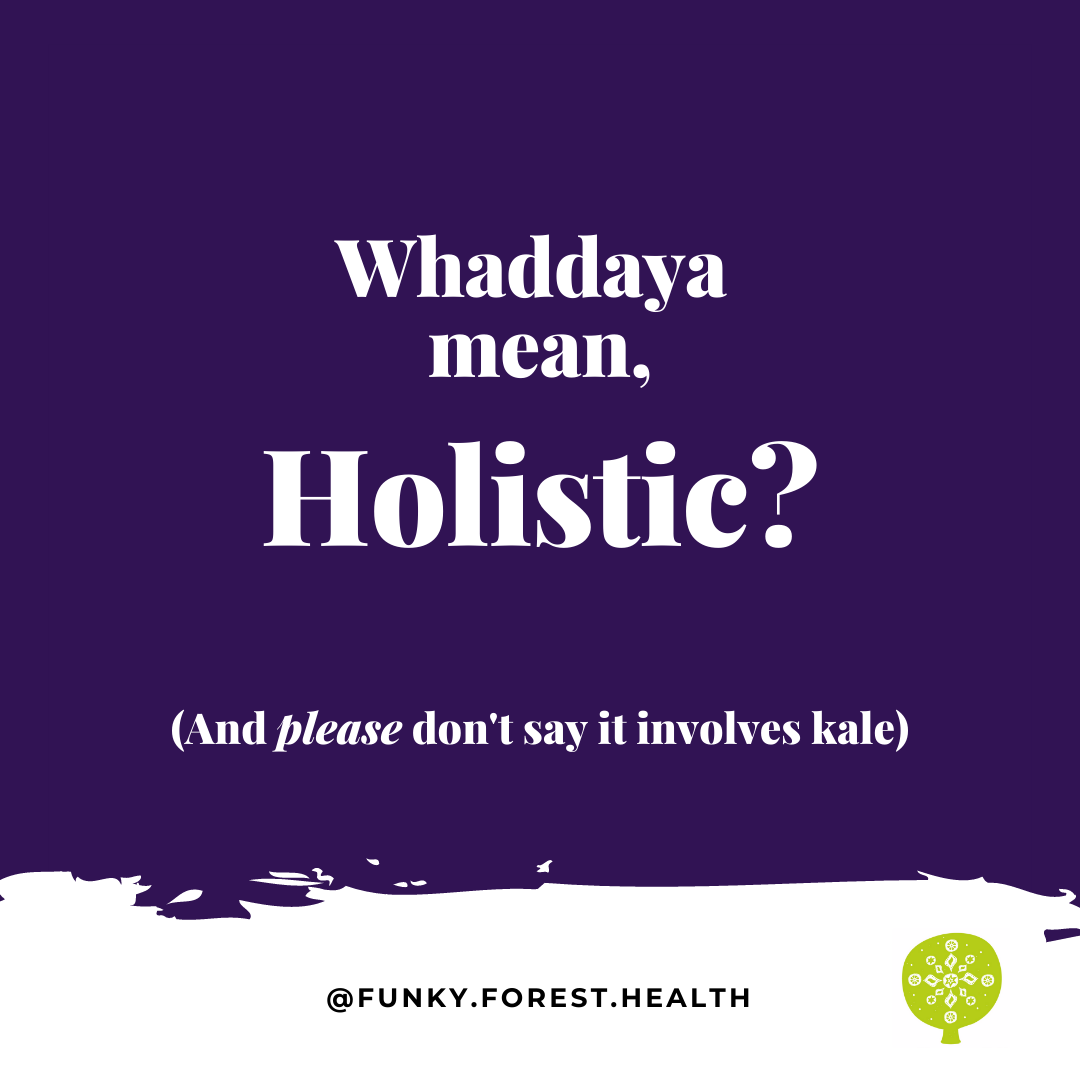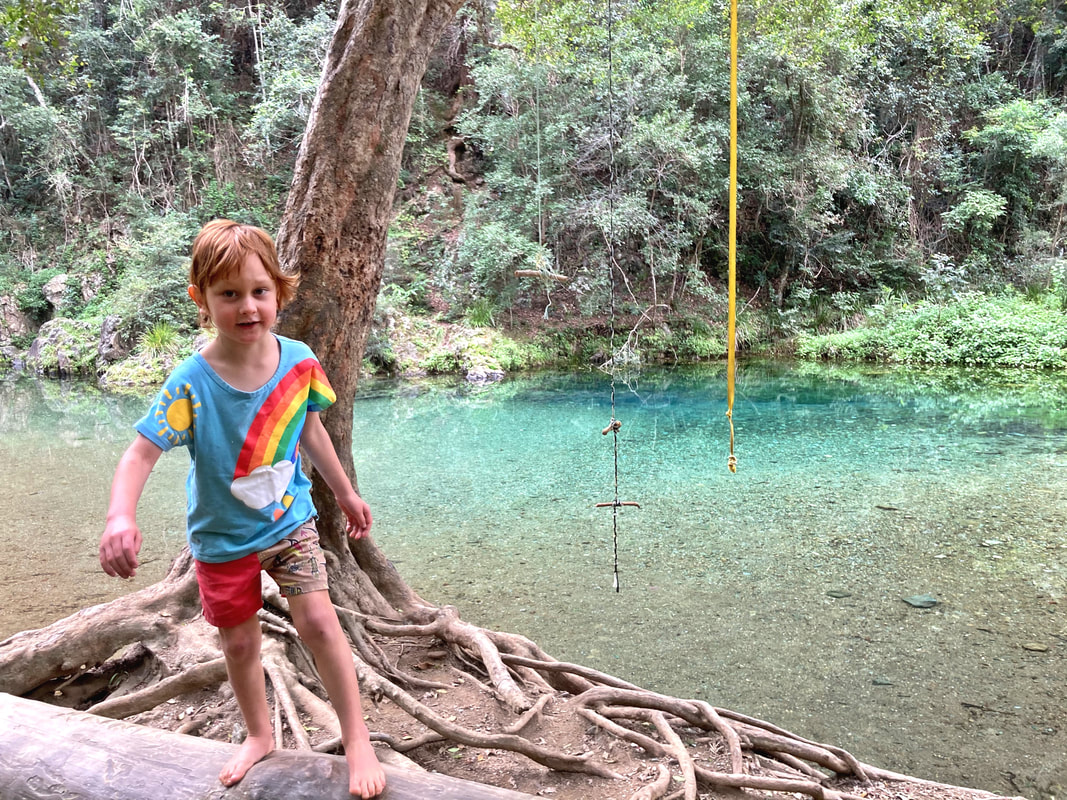I think this is deeply inaccurate. At least, it’s not what I mean when I describe myself as a holistic health practitioner.
Yesterday I was speaking with an experienced body worker (Julian at GET FIXED Remedial Massage) and was reminded of the way so-called holistic approaches are often used in a completely allopathic, symptomatic fashion, the very same pattern many of these alternative-seeking folks are trying to avoid.
What does this look like? Here are some examples of the “green allopathy” I see commonly:
- Ingesting X essential oil to fix multi-factorial, chronic gut dysfunction
- Taking one nutraceutical or herb to recover long term missing periods without considering behaviour, stress levels, mental and spiritual health
- Natural health practitioners who prescribe strict elimination diets to treat a person’s IBS, without addressing or even recognising an individual’s underlying disordered eating behaviours
- Folks self-prescribing bone broth fasts whilst still in denial about their eating disorder
- Getting MTHFR or pyrrole testing (and treating indefinitely with supplements) without addressing deeper issues like chronic malnutrition, mental health and stress.
A truly holistic approach doesn’t simply look for unidirectional cause and effect. Black and white solutions. This = that. Instead it looks at the entire interconnected web of factors impacting an individual’s health.
Nutrition and exercise are just two (not as all-important as we've been lead to believe) factors! There are so many other determinants of health, such as:
- socioeconomic status
- genetic variability
- trauma
- environment
- presence and degree of oppressive systems (eg. racism, weight stigma, homophobia, sexism, ableism), and
- stress levels due to all of these factors.
There is NO point telling folks that they’d just be healthier if they ate more organic veggies and started practising clinical Pilates, if they’re under the poverty line and barely able to stay awake to cook dinner after working 3 jobs to look after their kids.
A truly holistic approach takes all of these factors into consideration. I think that we need to recognise the fact that 50% of women (and up to 75% by some research) have some form of disordered eating that will in all likelihood be impacting their long term health (Bulik, 2008).
We need to acknowledge that weight stigma and poverty and other forms of oppression are real and these impact many folks’ ability to nourish themselves in a so-called ideal way, or to trial any of these “wonder” lifestyles (read: diets) and forgo all grains, dairy, legumes, sugar and other major accessible food groups for the sake of adhering to a paleo label.
Truly holistic medicine acknowledges these barriers and tries to lower them.
For practitioners: whether it’s offering a sliding scale or community classes to improve access to services, educating people on how to forage highly nutritious and wild foods that cost little to nothing, providing free talks or information, or simply taking the time to properly explain things to your clients during a consult... there are ways to improve accessibility to and effectiveness of health knowledge and services.
For individuals: your health doesn’t hinge on whether you can afford the autoimmune paleo diet this month, or $400 worth of supplements, or becoming an MLM essential oil distributor just to be able to keep accessing all the oils you’ve been convinced you need to maintain your health. Your health is influenced by many factors including cultural conditioning (e.g. the belief that thin = healthy. Or lean = healthy. Or even that natural = healthy). There are ways to truly look after yourself that won’t break the bank, ask you to change jobs, or require immense privilege.
You can go to a health practitioner (science-based OR traditional) and experience a truly holistic approach. This is what I experienced yesterday with Julian, a strictly science-based practitioner who went beyond just giving me a massage and took the time to explain what was happening in my body, and the impacts emotional and mental health can have.
Similarly you can be treated symptomatically with a myopic focus on pathology, not overall health, regardless of the type of practitioner you’re seeing.
“Holistic” isn’t an approach that is solely and automatically practised by natural health practitioners. Nor is it out of the realms of possibility for “mainstream” medical folk to practice holistically. We need to stop thinking in such reductionist terms and look beyond the marketing and labels if a truly holistic approach is what we’re after.
If a practitioner cares about you as a whole person (physical, mental, emotional, and spiritual) and works alongside you to restore health, then chances are they are “holistic”... whether or not they market themselves as such.
Finally... sometimes all that is needed to stimulate the body’s self-healing mechanisms are the basics: fresh air, clean water, sunlight. A holistic approach doesn’t have to be complicated. This picture of my son Archie at the beautiful Booloumba Creek Falls reminds me of the healing power of nature, and how simple it can often be to begin restoring health.



































 RSS Feed
RSS Feed



